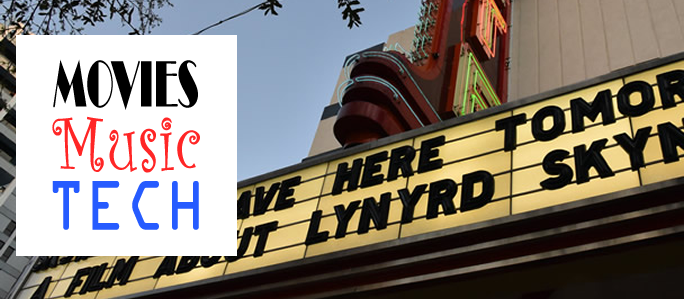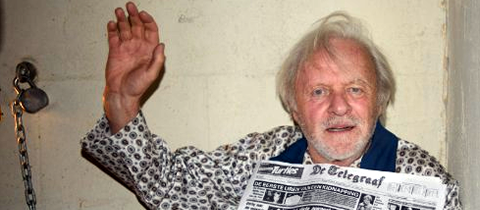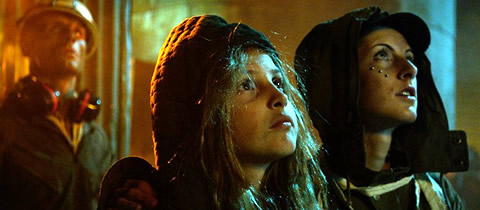(Originally published on Blogcritics.org)
How much is the life of a billionaire worth? That and other questions about life, relationships, and greed are explored inKidnapping Mr. Heineken, staring Sir Anthony Hopkins (The Lion in Winter, Silence of the Lambs) as Dutch beer entrepreneur Alfred “Freddy” Heineken, and Jim Sturgess (The Other Boleyn Girl, Cloud Atlas) and Sam Worthington (Avatar, Clash of the Titans) as the brains behind the grab.
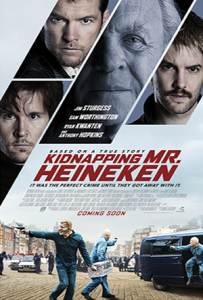 Directed by Daniel Alfredson (The Girl Who Played with Fire, The Girl Who Kicked the Hornet’s Nest), this film is not the typical “heist flick” in the Oceans 11-The Italian Job genre. It goes much deeper.
Directed by Daniel Alfredson (The Girl Who Played with Fire, The Girl Who Kicked the Hornet’s Nest), this film is not the typical “heist flick” in the Oceans 11-The Italian Job genre. It goes much deeper.
The screenplay, by William Brookfield (Rough Magic, Close Your Eyes) was based on the book by Emmy-award‐winning crime journalist Peter R. de Vries. De Vries was drawn to the story because the ransom paid in the 1993 crime was the largest ever paid in a kidnapping to that time – 35 million Dutch guilders, the equivalent of about 50 million dollars today. He befriended the kidnappers and got the personal edge that makes this story different.
In the beginning of the film, we meet the “bad guys” and almost immediately begin to feel sympathetic for them. They are five childhood friends who have gone into the construction business, but have been hit hard by the world-wide economic slump of the early 1990’s.
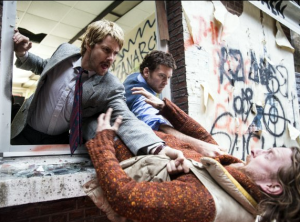
They apply for a loan but the banker won’t agree to give them one without collateral. They own a building but it has been overrun by squatters and the progressive-liberal government sides with the squatters. The men take the issue into their own hands and try to physically eject the squatters but end up in jail themselves. This is our first indication we might be dealing with a Dutch version of The Gang that Couldn’t Shoot Straight.
In jail one of the gang observes about their violent eviction of the squatters: “If we were in Texas they’d throw us a parade, but here, not so much.” They are victims of the economy and their own country.
They pass the point of no return when they decide to rob a bank – yes, the one that refused to give them the loan. The proceeds from the robbery go towards supplies and to hold them over till they can plan and execute the kidnapping. In preparation, they use their construction skills to build sound proof cells to house Heineken and his chauffeur.
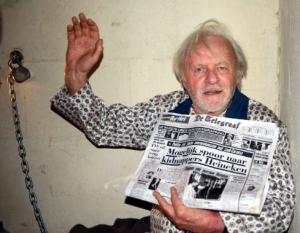
The chauffeur is taken in case they need to prove that they are “serious” and not a bunch of amateurs. But then these “dangerous men” borrow the copy machine from the accountants next door in order to make a fingerprint-free copy of the ransom note, and don’t remember till the next day that they left the original in the copy machine.
The stress of all this, and the dominant personality of the captive Mr. Heineken, played masterfully by Hopkins, eventually leads to their life-long friendships breaking down. Heineken tells them, “There are two ways a man can be rich in this world. He can have a lot of money or he can have a lot of friends, but he can’t have both.”
When we get to the climax of the film, only Cor and Willem are still together. The climax itself is not very “Hollywood.” The screenwriter and director went for historical accuracy – a rare and somewhat refreshing approach to filmmaking.
I enjoyed this film, and would have even if I hadn’t drunk two bottles of Heineken while I was watching it.Kidnapping Mr. Heineken opens in theaters, VOD and iTunes on March 6.
